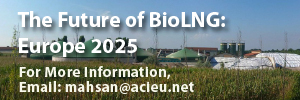New technology could allow biogas to be pumped directly into vehicles
Dr Fateme Rezaei, associate professor of chemical and biochemical engineering at Missouri University of Science and Technology is working on technology that would allow low-pressure storage as well as gas separation through adsorption in the same fuel tank. A porous material in the tank would also separate CO2 from methane and sequester the CO2 so that it could be returned as a commodity to the fuelling station.
Since the fuel tank would be on board a vehicle, no pipelines or transportations are necessary. The technology would allow a driver to choose between running a natural gas engine on low-grade RNG or a high-grade blend of RNG and renewable hydrogen (RH2), which is also stored in the tank.
“The fuel would be doubly green in terms of environmental impact because it produces from green energy technologies – RNG from biowaste and RH2 from wind and solar to enrich natural gas,” said Rezaei. “Plus, it requires no transportation.”
Rezaei said there is abundant biogas production from organic waste in municipal and agricultural areas in the US, but few facilities progress the biogas into useable vehicle fuel because of the expense.
“It costs too much for smaller operators to clean biogas to pipeline standards, including the separation of CO2. They offer lower-grade RNG for heating and electricity production, but conventional natural gas vehicles run on pipeline-grade natural gas or compressed natural gas. Compressing RNG to fuelling station pressure is too expensive for small biogas operators.”
Regions with no nearby intrastate or interstate pipelines may not find RNG production appealing, according to Rezaei, which is another ‘hurdle’ in RNG-to-vehicle fuel conversion. RH2 plants with no natural gas pipelines nearby cannot inject their RH2 into the pipeline grid to enrich the natural gas.
The research is supported by a $550,000 (€468,000) grant from the National Science Foundation. Rezaei is working on the project with the University of Missouri-Columbia’s Dr Carlos Wexler, professor of physics; Dr Peter Pfeifer, professor emeritus of physics, and Brett Marland, senior licensing and business development associate.
“This could benefit farmers and others in rural areas,” said Rezaei. “Biowaste is plentiful in those areas, and this technology would reduce the barriers to fuelling vehicles with natural gas.”























